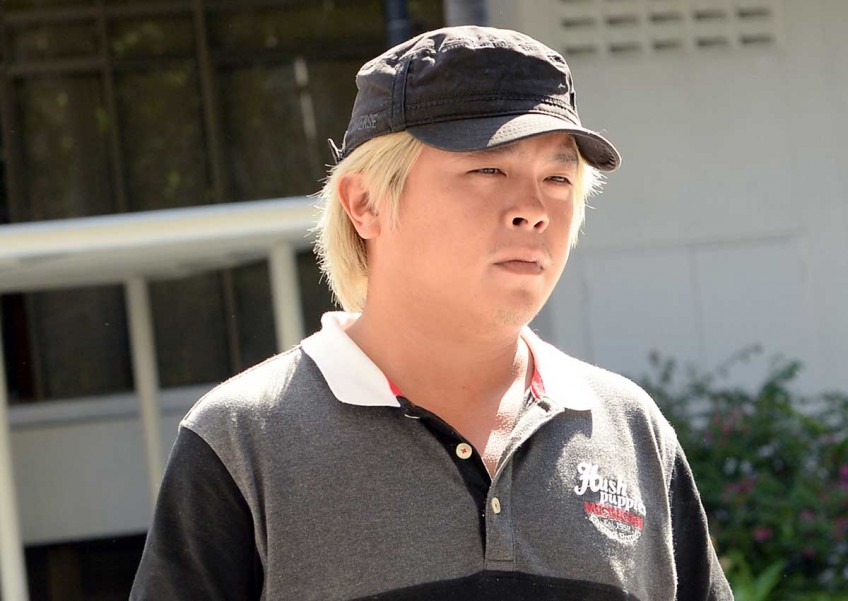He's their 'mastermind'

In six months, they cheated 25 people of their hard-earned-cash.
The four freelance sales executives from the now-defunct Mobile Air mobile phone shop at Sim Lim Square duped a whopping $16,149 from their unsuspecting customers between April 15 and October 27, last year.
Yesterday, Kam Kok Keong, 31, Kelvin Lim Zhi Wei, 32, Lim Hong Ching, 34, and Koh Guan Seng, 38, each pleaded guilty to between one and six cheating charges.
And their alleged accomplice and mastermind who was named in all of their charges was the store director, Jover Chew Chiew Loon, 33.
Mobile Air first made headlines in October last year after it refunded $1,010 to a customer in coins.
It was in the spotlight again the following month after a Vietnamese tourist was caught on a viral video kneeling in the shop and begging for a refund.
The court heard yesterday that the four men worked for Chew and each received a 40 per cent commission on profits made on mobile phone sales. Chew actively managed Mobile Air and recruited his sales staff.
According to court documents, Chew, whose case is still pending, controlled the pricing of the mobile devices in the shop located on the ground floor of the shopping mall.
He also allegedly came up with schemes to cheat his customers.
For example, his salesmen would open the plastic shrink-wrapped packaging of the devices after their victims paid for them. They would then try to cheat their customers by forcing them to pay for additional items such as "warranty".
After each transaction, the salesmen would hand over the money to Chew, who usually sat in a room at the back of the shop.
If their victims walked away without their purchases following a dispute, Chew would use a sealing machine to repackage the products with plastic shrink-wrap.
He would then set the devices aside until the conclusion of any Small Claims Tribunal hearings or investigations by the Consumers Association of Singapore.
After some time, the products would be re-introduced to the shop and put on sale.
Because the devices had been re-wrapped, the salesmen would lie to their customers, claiming that they were brand new.
Kelvin Lim Zhi Wei and Lim Hong Ching were each offered bail of $10,000.
Koh and Kam were each offered bail of $20,000.
The four men will be back in court on Oct 14.
For each count of cheating, they can be jailed up to 10 years and fined.
HOW THEY CHEATED BUYERS
Jover Chew came up with a code based on the word "Singapore" to indicate the "cost price" of the mobile devices in his Sim Lim Square shop.
The letter "S" represented "1", the letter "I" represented "2" and so on. Any other letters represented "0". So, if the cost price of a product was $1,148, the letters "SSGR" would be stated on its packaging.
The salesmen had to sell the products higher than the cost price. Otherwise, they would be personally liable to make up for the differences in sales.
To entice customers, they would firstly offer a product at an attractive price, lower than what had been stated in the code. After their victims paid for the items at these lower prices in full, the salesmen would confront them with various tactics to fleece them.
USING INVOICES
The salesmen would unwrap the products and ask their victims to sign an invoice which showed the attractive price.
However, they would not hand over the devices to their customers.
After the signed invoices were handed over, the salesmen would write down additional items on the documents, showing extra charges.
These included items such as "warranty" or "in-house package".
The salesmen would then force their victims to pay for these additional items.
They would use the signed invoices, which showed the extra charges, as a basis for refusing to hand over the products.
The devices were handed over only when their victims paid up.
The victims might also negotiate to pay a smaller additional amount to obtain their products or by settling for a cheaper device.
USING 'WARRANTY FORMS'
After their victims paid for their products at the initial lower and attractive prices, the salesmen would induce them to sign "warranty forms" which Chew had developed.
Without explaining their contents to their victims, the salesmen would claim that the forms were only for record-keeping purposes.
After inflating the cost on the invoice, they would produce the signed warranty forms to pressure their victims into paying up for the additional charges.
'CANCELLATION FEES'
If the victims wanted to abort their purchases, the salesmen would either refuse a refund or retain a large proportion of the money paid through so-called "cancellation fees".
These fees supposedly protected Mobile Air against losses incurred as the salesmen had already unwrapped the products.
The victims would be shown cancellation forms which showed bogus items such as "$100 for opportunity cost" and "$180 for reflashing (sic) service".

This article was first published on October 2, 2015.
Get The New Paper for more stories.